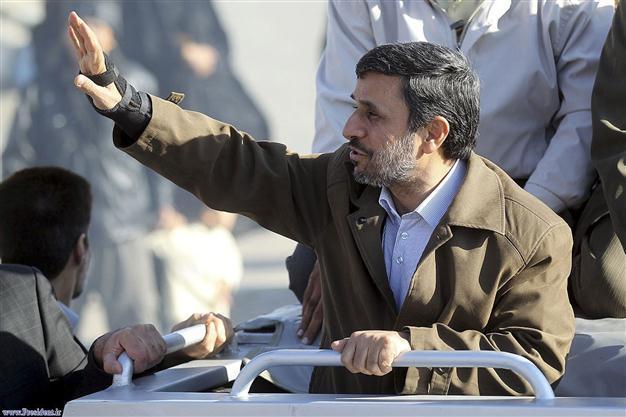
Iranian President Mahmoud Ahmadinejad. Reuters photo
Candidates began registering on Saturday for Iran's parliamentary elections in March, the first litmus test of the clerical establishment's popularity since the 2009 disputed presidential vote.
Candidates started to sign up in over 1,000 constituencies to run for parliament's 290 seats, state radio said.
Registration will last one week after which entrants will be screened for their political and Islamic qualifications by the hard-line Guardian Council electoral watchdog.
Incumbent Mahmoud Ahmadinejad won the presidential election in 2009 and reformist challengers Mirhossein Mousavi and Mehdi Karoubi called the result a "dangerous charade" and thousands of protesters clashed with police.
That election, which was followed by eight months of anti-government street protests, created a deepening political rift among the hard-line rulers.
Mousavi and Karoubi have been put under house arrest since February and the judiciary has banned main reformist political parties since the vote, which the opposition said was rigged.
Analysts say Ahmadinejad's allies want to secure a majority in the parliamentary elections, which they hope will pave the way for winning the presidential vote in 2013.
Leading reformist politicians said pro-reform groups will not submit a separate list of candidates because basic needs of a "free and fair" vote have not been met.
Authorities are concerned a low turnout would question the establishment's legitimacy.
Parliament does not determine policy in areas such as Iran's disputed nuclear programme, oil or foreign affairs. However, it has an influence on economic policy.
Conservatives are expected to retain control of the next parliament, but the assembly is expected to be more vocal in its criticism of Ahmadinejad's economic management with an increased number of critical hard-line members.
Parliamentary speaker Ali Larijani is a staunch critic of Ahmadinejad who is under mounting pressure from the public, top clerics and the outgoing assembly mainly over his handling of economy.
Frustration is simmering among lower- and middle-class Iranians. Prices of most consumer goods have risen substantially and many Iranians struggle to make ends meet.
DANGER OF LOW TURNOUT
Concerned over the low turnout, hard-line rulers have called on voters to participate in the March 2 elections.
"The enemy is trying to make sure people will not take part in the elections. It is trying to see the election boycotted or minimum participation," cleric Ahmad Jannati told worshippers on Friday.
Hopefuls must go through a vetting process by government committees and the 12-member Guardian Council of clerics and jurists.
The Council has stopped hundreds of reformist candidates in the past from participating in elections. A grandson of late revolutionary leader Ayatollah Ruhollah Khomeini was banned from running for a 2008 parliamentary vote by the Council.
Ahmadinejad and his allies are accused by many Shi'ite clerics and politicians of trying to undermine the central role of the clergy in politics by emphasising nationalist themes of Iranian history and culture.
"The Supreme Leader (Ayatollah Ali Khamenei) and his allies are trying to control the ambitious president ... Iran's international isolation and Ahmadinejad's economic policies are worrying the establishment," said analyst Hamid Farahvashian.
Iran's most powerful figure Khamenei suggested in October that the position of president might be eliminated, highlighting the deepening political infighting that surfaced in April when Khamenei re-instated Ahmadinejad's sacked intelligence minister.
"It was a warning to Ahmadinejad and his allies, who wanted to win the parliamentary vote and then the next presidential vote," said Farahvashian.
In the past months, dozens of people have been arrested over the country's biggest banking scandal. Some parliamentarians have linked Ahmadinejad's close aide Esfandiar Rahim Mashaie to the lead suspect of the scandal.